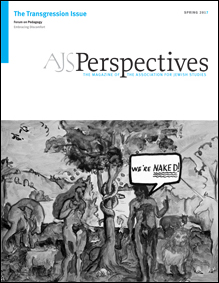
In 1998, I attended the AJS annual meeting for the first time. As a bright-eyed graduate student, I attended all the panels I could. And so on the Monday evening of that conference, I was one of scores of scholars in the audience for a plenary panel entitled "The State of Israel and Jewish Studies around the World: On Israel's Fiftieth Birthday." While the program from that year lists four speakers, two of the papers have lodged permanently in my mind: those on the purpose and nature of Jewish Studies by Hava Tirosh-Samuelson, filling in for an absent Yael Feldman, and by Elliot Wolfson. (Tirosh-Samuelson was kind enough to send me a copy of her remarks, which were never published. An expanded version of Wolfson's remarks appeared in AJS Perspectives in 2001.)
Although neither of these two papers used the words "transgressive" or "transgression," their arguments tackled the issue of just how transgressive Jewish Studies was—and ought to be—as an academic field. Tirosh-Samuelson cautioned the audience against making Jewish Studies an academic field just like any other. In a call that some today might deem to have been prophetic, she proclaimed that "if we continue to do business as we imagine corporations go about theirs, we will find ourselves in larger and larger academic conferences with more and more sessions and papers, but we will write them for ourselves while at the same time writing ourselves off the map of Jewish life." What was needed instead was for Jewish Studies scholars to "highlight the religious dimension of our life-long intellectual commitments" so that Jews might take up the activity of learning about the Jewish past. Tirosh-Samuelson did not say this openly, but her stance at that time—she may very well have changed her mind in the last two decades!—implicitly assumed that Jewish Studies scholarship was for Jews and for Jews alone.
But if Tirosh-Samuelson wanted Jewish Studies to transgress the norms of the secularized Christian university, Wolfson wanted academic Jewish Studies to transgress its own history and cast off the weight of the decades when Jewish Studies scholars were themselves Jews. When non-Jewish scholars of Judaism would join the community of Jewish Studies scholars, this would mark the worthiness of Jewish Studies in the university. It would grant Jewish Studies a kind of honor about which Tirosh-Samuelson did not seem to care, for in Wolfson's view (again, at least at that time) "the study of Judaism by someone completely outside of that culture is the ultimate litmus test of the success of Jewish studies within the academy." Still, not unlike Tirosh-Samuelson, Wolfson too seemed to describe the future of Jewish Studies in somewhat spiritual terms. In 1998, he thought that a Jewish Studies scholarly community that included both Jews and non-Jews would perhaps better be able to heed the sacred texts of the past. The multiplicity of interpretations would compel "us to hear the word again and again as if we were hearing it for the first time."
If I no longer remember what it felt like to hear these papers, it might be because both of them touched what were at that time deep-seated aspects of my identity. In 1998, I identified as Jewish, both in the ethnic and religious senses of that adjective. Shortly after I began preparing to convert to Judaism in the mid-1990s, my sister and I visited relatives in Prague, where my mother's brother's ex-wife's new husband—got that?—told us a story about the secret Jewish identity of my mother's maternal ancestors. And so I had already reached my telos without knowing it. Why should I continue to prepare to convert? As a Jew, I was now the explicit audience of Tirosh-Samuelson's paper. Still, as someone who was deeply unsure of how to perform my newfound Jewish identity, as a graduate student, as an outsider to the yeshivish I heard in the halls of the Westin Copley Place, and as a gay scholar in what was at the time a far more heteronormative AJS, I also felt a deep exhilaration in hearing Wolfson's description of the importance of having non-Jews within Jewish Studies.
In the last two decades, I have ceased to identify as Jewish. My belief in God, and my belief in belief, were extirpated when I became a widower in 2007. In the late 2000s, an archivist in Brno cast doubt on my ethnicity when he pronounced my mother's family story unverifiable, for her relatives are marked as baptized Catholics and are buried in Catholic cemeteries. For reasons that I prefer not to know, my mother began the process of converting to Judaism after she discovered this. I, however, had tired of identifying. Or perhaps I had tired of passing. Or perhaps I had just tired of hoping that my Slavic last name, which is not specifically Jewish, would do the passing for me. Today, I would much rather think about Hermann Cohen, or S. Yizhar, or Rabban Gamaliel, than about myself. Still, those papers from 1998 remain in my mind, and I think about Tirosh-Samuelson and Wolfson every time a student kindly demands that I identify myself, by asking me whether I am Jewish. I think of them every time I answer that student by saying that as a scholar who sojourns with the Jewish theological and philosophical tradition, and with Jewish philosophers and theologians, the most apt word (but certainly not the ideal word) for me is the Hebrew term ger, in its biblical sense of "fellow traveler."
Those papers still call to me. Now they no longer demand that I identify myself. But they do demand that I identify the stakes of my thinking. When I give a lecture or teach a class, do I not want some kind of commitment on the part of my audience, of the kind that Tirosh-Samuelson described? When I read a talmudic text with a group of students, do I not desire that they hear this text anew, as Wolfson demanded? Where does the boundary lie between the religious and the secular performance of these desires, anyway? And how, all these years later, can I pick between these two eminent scholars? To side with Tirosh-Samuelson is to transgress the bounds of the university; to side with Wolfson is to acknowledge that Jewish tradition is nothing but a series of transgressions. There can be no thinking of a path out from this double bind that doesn't involve one transgression or another.
These papers now, together, call me to imagine Jewish philosophy, the field of study I share with both Tirosh-Samuelson and Wolfson, as a home for transgression and transgressiveness. This is the heresy that I write. This is the heresy that I am.

